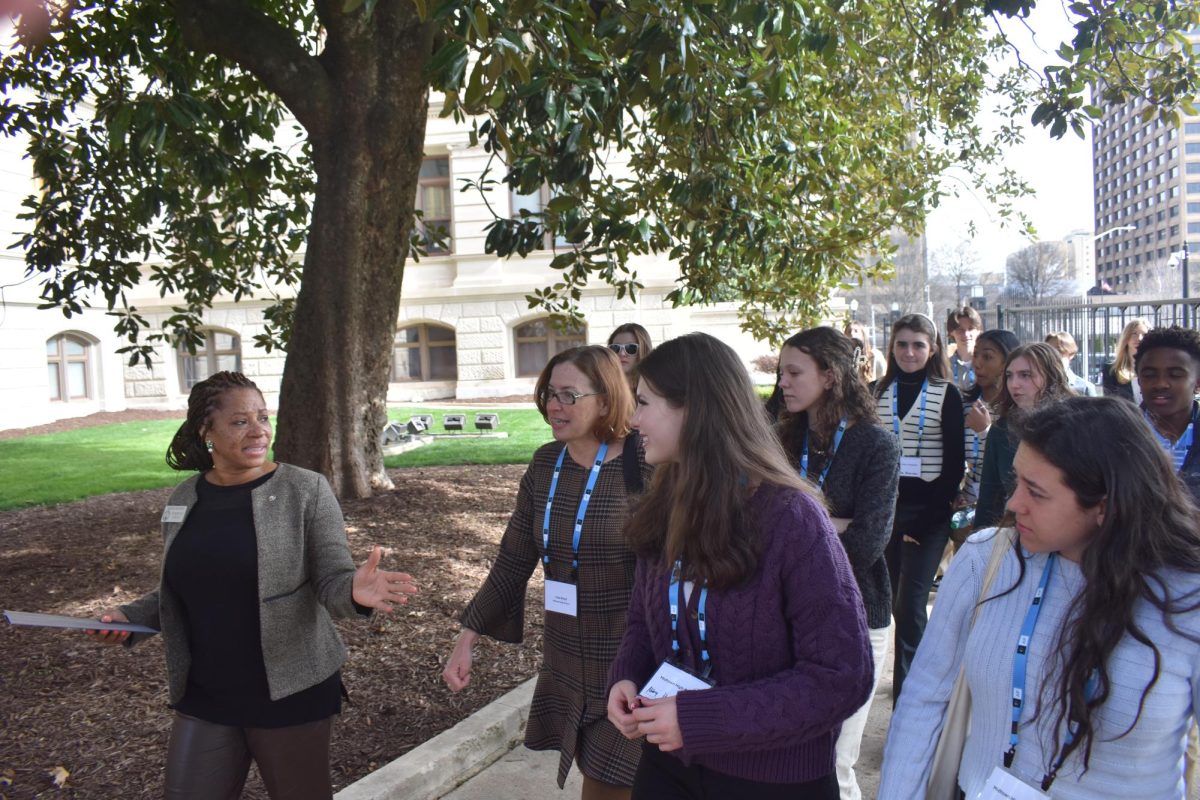
Throughout October, dozens of teachers had to stop their lesson plans to administer the two-day Student Learning Objectives (SLO) assessment. SLOs are a new state mandated way to measure teacher effectiveness.
“My department all took two days so that left [teachers] with two or three day long tests and a four day span in which to administer them,” Literature teacher Suzie Mercer said. “Nevermind if you had anything else planned.”
SLOs are an element of the Teacher Keys Evaluation System (TKES), a part of the Race to the Top initiative implemented by President Obama. Georgia piloted the TKES in 26 districts. Georgia received nearly $400 million from the U.S. Department of Education Race to the Top grant money. According to the Georgia Department of Education’s “Georgia Race to the Top (RT3) Overview,” Georgia was awarded the money through a competitive grant provided by the U.S. Department of Education. Through Race to the Top, states applied for grants by submitting proposals to the U.S. Department of Education.
Grants range from $20 million to $700 million and were allotted based on the budgetary requests made by the state as well as the quality of the state’s proposal for spending money. Susan White, program manager in the Teacher and Leader Effectiveness Division at the Georgia Department of Education, said the Governor’s office created the proposal.
In Georgia, only classes that do not culminate with an End of Course Test (EOCT) must take the SLO assessments. Both the EOCTs and SLOs measure teacher effectiveness.
According to a report released by the U.S. Department of Education titled “Targeting Growth: Using Student Learning Objectives as a Measure of Educator Effectiveness,” the Denver Public Schools System was the first school system to use SLOs. They began in 1999 to “link teacher pay to student outcomes.”
Communications and journalism academy leader Carrie MacBrien said each district creates its own SLOs as part of the TKES. APS chose to implement the TKES system this year and will be awarded $10 million each year in order to implement the program.
In spite of efforts by the state and district to increase teacher leadership and effectiveness, there has been backlash to the new system. Although many teachers understood the idea of testing students’ knowledge, they felt the tests lost validity for several reasons.
“To me, there was no forethought,” Mercer said. “How do you give a pretest in the seventh week of school?”
James Campbell, AP World History and AP Comparative Government and Politics teacher, said he agrees with Mercer.
“Some of these tests were terrible,” Campbell said. “One of the geography teachers showed me a geography test and it said ‘label the following countries.’ The countries were the Pacific Ocean, the Atlantic Ocean, the Mediterranean Sea, Antarctica and Australia.”
Campbell said he believes the test makers were capable of creating accurate tests, but the tests were probably rushed and not thoroughly inspected.
Campbell was asked to write an SLO assessment for AP Comparative Government and Politics. With three days notice, Campbell was told to leave three days worth of plans for a substitute. Then, he worked with another APS AP Comparative Government and Politics teacher to create a test, answer sheet, rubric and answer key. He never received the AP Comparative Government and Politics SLO assessment. When Campbell was ready to administer the AP World History SLO Assessment, he noticed that there were not enough test books for his classes.
“I asked about the books when we first got them and again about two days later,” Campbell said. “I’ve never received them. My 3B class has never taken the SLO.”
Students had varying opinions of the assesments. Sophomore Christopher Brown took SLOs in two subjects, physics and advanced composition.
“I was supposed to take three,” Brown said. “I just never took it for [AP Statistics]. Mr. Nichols told me to take it. I just never went to his class and he never asked me again.”
Brown found the tests to be fairly easy.
“[It was] like any other standardized test that we’ve taken,” he said. “Kind of like the CRCT.”
In light of the recent CRCT cheating scandal in APS, many teachers feel uncomfortable grading assessments that will be used to evaluate their own effectiveness as a teacher.
“We just got over a cheating scandal that involved teachers trying to make themselves look better by altering test scores,” Campbell said. “I would like almost the additional protection of being able to say ‘I could not have altered these scores. I didn’t have access to them.’ Not only do I have access, I’m the one who’s grading it. Some of the more paranoid and conspiracy minded instructors—not here but that I’ve talked to at other schools—feel like they’re being set up. Like if anything goes wrong with these scores, the district is going to be able to look at them and say ‘Oh, you’re cheating.’”
Teachers hope problems such as these will be ironed out before the tests are issued again. MacBrien said APS plans for SLO Assessments to be given again at the end of second semester, but results will not impact teacher evaluations this year.







